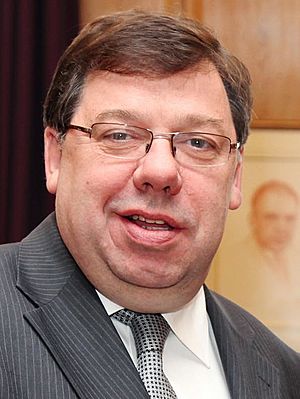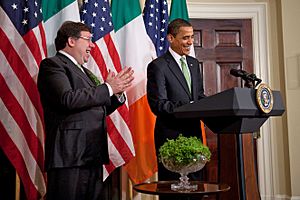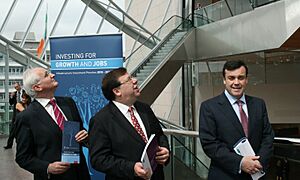Brian Cowen facts for kids
Quick facts for kids
Brian Cowen
|
|||||||||||||||||||||||||||||||||||||||||||||||||||||||||||||||||||||||||||||||||||||||||||||
|---|---|---|---|---|---|---|---|---|---|---|---|---|---|---|---|---|---|---|---|---|---|---|---|---|---|---|---|---|---|---|---|---|---|---|---|---|---|---|---|---|---|---|---|---|---|---|---|---|---|---|---|---|---|---|---|---|---|---|---|---|---|---|---|---|---|---|---|---|---|---|---|---|---|---|---|---|---|---|---|---|---|---|---|---|---|---|---|---|---|---|---|---|---|

Cowen in 2010
|
|||||||||||||||||||||||||||||||||||||||||||||||||||||||||||||||||||||||||||||||||||||||||||||
| Taoiseach | |||||||||||||||||||||||||||||||||||||||||||||||||||||||||||||||||||||||||||||||||||||||||||||
| In office 7 May 2008 – 9 March 2011 |
|||||||||||||||||||||||||||||||||||||||||||||||||||||||||||||||||||||||||||||||||||||||||||||
| President | Mary McAleese | ||||||||||||||||||||||||||||||||||||||||||||||||||||||||||||||||||||||||||||||||||||||||||||
| Tánaiste | Mary Coughlan | ||||||||||||||||||||||||||||||||||||||||||||||||||||||||||||||||||||||||||||||||||||||||||||
| Preceded by | Bertie Ahern | ||||||||||||||||||||||||||||||||||||||||||||||||||||||||||||||||||||||||||||||||||||||||||||
| Succeeded by | Enda Kenny | ||||||||||||||||||||||||||||||||||||||||||||||||||||||||||||||||||||||||||||||||||||||||||||
| Leader of Fianna Fáil | |||||||||||||||||||||||||||||||||||||||||||||||||||||||||||||||||||||||||||||||||||||||||||||
| In office 9 April 2008 – 26 January 2011 |
|||||||||||||||||||||||||||||||||||||||||||||||||||||||||||||||||||||||||||||||||||||||||||||
| Deputy | Mary Coughlan | ||||||||||||||||||||||||||||||||||||||||||||||||||||||||||||||||||||||||||||||||||||||||||||
| Preceded by | Bertie Ahern | ||||||||||||||||||||||||||||||||||||||||||||||||||||||||||||||||||||||||||||||||||||||||||||
| Succeeded by | Micheál Martin | ||||||||||||||||||||||||||||||||||||||||||||||||||||||||||||||||||||||||||||||||||||||||||||
|
|||||||||||||||||||||||||||||||||||||||||||||||||||||||||||||||||||||||||||||||||||||||||||||
| Teachta Dála | |||||||||||||||||||||||||||||||||||||||||||||||||||||||||||||||||||||||||||||||||||||||||||||
| In office June 1984 – February 2011 |
|||||||||||||||||||||||||||||||||||||||||||||||||||||||||||||||||||||||||||||||||||||||||||||
| Constituency | Laois–Offaly | ||||||||||||||||||||||||||||||||||||||||||||||||||||||||||||||||||||||||||||||||||||||||||||
| Personal details | |||||||||||||||||||||||||||||||||||||||||||||||||||||||||||||||||||||||||||||||||||||||||||||
| Born | 10 January 1960 Tullamore, County Offaly, Ireland |
||||||||||||||||||||||||||||||||||||||||||||||||||||||||||||||||||||||||||||||||||||||||||||
| Political party | Fianna Fáil | ||||||||||||||||||||||||||||||||||||||||||||||||||||||||||||||||||||||||||||||||||||||||||||
| Spouse |
Mary Molloy
(m. 1994) |
||||||||||||||||||||||||||||||||||||||||||||||||||||||||||||||||||||||||||||||||||||||||||||
| Children | 2 | ||||||||||||||||||||||||||||||||||||||||||||||||||||||||||||||||||||||||||||||||||||||||||||
| Parent |
|
||||||||||||||||||||||||||||||||||||||||||||||||||||||||||||||||||||||||||||||||||||||||||||
| Relatives | Barry Cowen (brother) | ||||||||||||||||||||||||||||||||||||||||||||||||||||||||||||||||||||||||||||||||||||||||||||
| Education | Cistercian College, Roscrea | ||||||||||||||||||||||||||||||||||||||||||||||||||||||||||||||||||||||||||||||||||||||||||||
| Alma mater | University College Dublin | ||||||||||||||||||||||||||||||||||||||||||||||||||||||||||||||||||||||||||||||||||||||||||||
| Signature | |||||||||||||||||||||||||||||||||||||||||||||||||||||||||||||||||||||||||||||||||||||||||||||
| n.b. | |||||||||||||||||||||||||||||||||||||||||||||||||||||||||||||||||||||||||||||||||||||||||||||
Brian Bernard Cowen (born 10 January 1960) is an Irish former politician. He served as Taoiseach (Ireland's Prime Minister) and Leader of Fianna Fáil from 2008 to 2011.
Brian Cowen was a TD (a member of the Irish Parliament) for the Laois–Offaly area from 1984 to 2011. He also held several important government jobs between 1992 and 2011. These included being the Minister for Finance (in charge of the country's money) from 2004 to 2008 and Tánaiste (Deputy Prime Minister) from 2007 to 2008.
In May 2008, Brian Cowen was chosen as the leader of the Fianna Fáil political party. This happened after Bertie Ahern stepped down. Cowen was then chosen by Dáil Éireann (the Irish Parliament) to become the new Taoiseach.
Soon after he became Taoiseach, Ireland faced big money problems, including a financial crisis and a banking crisis. His government had to ask for financial help from the European Union and the International Monetary Fund. This was a very difficult time for Ireland.
During his time as leader, public support for his party, Fianna Fáil, dropped very low. In January 2011, Brian Cowen resigned as the leader of Fianna Fáil. He remained Taoiseach until after the general election in February 2011. After the election, he left politics.
Contents
Early Life and Family
Brian Cowen was born in Tullamore, County Offaly, Ireland, on 10 January 1960. He grew up in Clara. His parents were May and Bernard Cowen. His father, Bernard, was also a politician, serving as a TD and a Senator for Fianna Fáil.
His family owned a pub, a butcher shop, and a funeral business in Clara. Brian often helped out as a barman in his father's pub when he was younger. He has two brothers, Christopher and Barry. Barry Cowen also became a TD for Laois–Offaly in 2011.
Brian Cowen went to school in Clara and then to Cistercian College of Mount St. Joseph in Roscrea, County Tipperary. He started at Mount St. Joseph College as a boarding student when he was twelve. After secondary school, he studied law at University College Dublin. He later became a solicitor.
He enjoys sports and is a member of the Gaelic Athletic Association. He is still the president of the Clara GAA club, where he played Gaelic football in the early 1980s. He also played for the Offaly county team. Brian Cowen is married to Mary Molloy, and they have two daughters.
Starting in Politics
Brian Cowen was first elected to Dáil Éireann in June 1984. This happened in a special election after his father, Bernard Cowen, passed away. At 24 years old, Brian Cowen was the youngest member of the Dáil at that time. He also joined the Offaly County Council in the same year, taking over his father's seat. He served on the council until 1992.
For the next seven years, Cowen was a regular member of the Fianna Fáil party in Parliament. In 1992, Albert Reynolds became the leader of Fianna Fáil and the Taoiseach. Reynolds chose Cowen, who was 32, for his first government job as Minister for Labour.
After the 1992 general election, Fianna Fáil formed a government with the Labour Party. Cowen was then made Minister for Transport, Energy and Communications.
Government Roles (1997–2008)
When Fianna Fáil returned to government after the 1997 election, Brian Cowen became Minister for Health and Children. This job was very challenging. He had to deal with problems like not enough hospital beds and crowded hospitals. There was also a long strike by nurses in 1999.
Minister for Foreign Affairs
In January 2000, Cowen became Minister for Foreign Affairs. In this role, he was involved in important talks about the Northern Ireland peace process. Ireland also had a seat on the United Nations Security Council during his time. In 2004, Cowen played a key part when Ireland was in charge of the European Council. During this time, the European Union grew from 15 to 25 member countries.
Minister for Finance
In September 2004, Cowen was appointed Minister for Finance. This meant he was in charge of the country's money and budget. On 1 December 2004, he announced his first budget, which increased government spending by 9%.
His second budget in 2005 focused on new childcare plans. It also aimed to make sure very wealthy people paid their fair share of taxes. Cowen's third budget in 2007, before the 2007 election, was one of the biggest spending plans in Ireland's history. It included more money for pensions and social welfare, and a small cut in the top income tax rate.
Leader of Fianna Fáil

During his time as a minister, many people thought Brian Cowen would become the next leader of Fianna Fáil. His position became stronger when he became the party's deputy leader in 2002. In 2004, he was made Minister for Finance. After the 2007 election, Cowen became Tánaiste (deputy prime minister).
On 4 April 2008, after Taoiseach Bertie Ahern announced he would resign, Cowen was put forward as the next leader. On 9 April 2008, he was officially confirmed as the seventh leader of Fianna Fáil. He became Taoiseach on 7 May 2008, after Ahern stepped down.
On 22 January 2011, Brian Cowen announced he was stepping down as leader of Fianna Fáil. He said this was to help the party before the 2011 election.
Taoiseach (2008–2011)
When Brian Cowen became Taoiseach, he formed a government with Fianna Fáil, the Greens, and the PDs.
Treaty of Lisbon
In June 2008, Irish voters rejected the Treaty of Lisbon. Some people saw this as a protest against Cowen and his government. The treaty was later approved by Irish voters in a second vote in October 2009.
2009 Budget
Cowen's government announced the 2009 budget on 14 October 2008. This was earlier than usual because of the 2008 financial crisis. The budget was called "the toughest in many years." It included new taxes and cuts to some services.
Many people were upset about some of the proposed changes, like those to medical cards and university fees. There were protests by teachers and farmers. On 22 October 2008, thousands of pensioners and students protested outside government buildings in Dublin.
Some members of the government's own party disagreed with the budget. Joe Behan, a TD from County Wicklow, resigned from Fianna Fáil because of the medical card changes. These disagreements showed that the government was facing challenges.
Anglo Irish Bank
Anglo Irish Bank had lent a lot of money for property development. When the property market went down in 2008, the bank faced big problems. On 15 January 2009, the government decided to take over the bank. This meant the bank became owned by the State.
2009 Emergency Budget
In April 2009, a second emergency budget was announced. This budget aimed to fix a large financial shortfall. It included more tax increases and cuts to public services. A new agency was set up to deal with bad loans from Irish banks. Cowen said these tough measures were necessary.
First No Confidence Vote
After Fianna Fáil did poorly in the June 2009 elections, the Fine Gael party tried to remove Cowen from power with a "no confidence" vote. He survived the vote, but support for his government continued to fall.
2010 Budget and NAMA
The government's third budget in 14 months was announced on 9 December 2009. This budget was very strict, with cuts to public sector workers' pay and social welfare. These cuts were very unpopular.
In February 2010, Cowen defended the National Asset Management Agency (NAMA). This agency was created to buy bad loans from banks. Cowen said NAMA would help banks lend more money to businesses. However, the International Monetary Fund (IMF) had suggested that NAMA might not lead to a big increase in lending.
Second No Confidence Vote
On 15 June 2010, Brian Cowen faced another "no confidence" vote from Fine Gael. This happened after reports criticized government decisions before the banking crisis. He survived this vote as well.
EU and IMF Rescue
On 21 November 2010, Brian Cowen confirmed that Ireland had officially asked for financial help from the European Union and the International Monetary Fund. This was a big step, as Ireland had tried to avoid it for a long time. On 28 November 2010, an €85 billion rescue deal was agreed upon.
On 24 November 2010, Cowen announced a four-year plan to fix the economy. This plan included unpopular measures like cuts to social welfare and an increase in value added tax. Cowen said an election would happen in early 2011 after the budget was finished.
Leaving Power
January Cabinet Changes
In January 2011, there was a lot of pressure on Brian Cowen to step down as leader of Fianna Fáil. On 16 January 2011, he said he would not resign but would ask his party members to vote on whether they still had confidence in his leadership. He won the vote, but the Foreign Minister, Micheál Martin, resigned from the government.
The next day, Cowen asked four more ministers to resign. He wanted to appoint new ministers to strengthen his party. However, the Green Party, who were part of the government, were very upset because they were not consulted. They refused to support Cowen's new choices. The Green Party then threatened to leave the government unless Cowen set a firm date for the general election. Cowen then announced the election would be on 11 March 2011.
Resignation as Leader
Facing a difficult situation, Brian Cowen announced his resignation as leader of Fianna Fáil on 22 January 2011. He said he would stay on as Taoiseach until the election to finish work on the 2011 budget.
However, the Green Party then left the government, leaving Cowen leading a minority government. This meant he had very few ministers and faced two "no confidence" votes in Parliament.
Finance Bill and Retirement
On 24 January 2011, a deal was made between the main political parties. They agreed to drop their "no confidence" votes if the finance bill was passed quickly. Once the bill was passed, Cowen would ask the President to dissolve Parliament.
The finance bill was passed on 27 January 2011. On 1 February 2011, Cowen asked President Mary McAleese to dissolve the Dáil, and she agreed. Cowen then confirmed the general election would be on 25 February 2011. He also announced that he would not run for his Dáil seat again and would retire from politics after 27 years.
Fianna Fáil suffered a huge defeat in the general election. They won only 20 seats, their worst result ever. Enda Kenny, the leader of Fine Gael, became the new Taoiseach on 9 March 2011.
Later Life
Brian Cowen became leader of Fianna Fáil and Taoiseach without ever facing an election for either role. Under his leadership, his party's support dropped significantly in the 2011 election. This was largely due to the financial crisis and the need for international financial help.
Cowen was sometimes criticized for not communicating well with the public. He accepted responsibility for the government's decisions during the crisis.
In March 2012, Cowen gave a speech in Washington, D.C. It was his first public comment since leaving office. He defended his government's decision to guarantee the banks in 2008. However, he admitted that his government should have increased taxes and cut spending earlier. He also said his government should take some blame for Ireland's economic problems.
In May 2014, Cowen joined the board of Topaz Energy. In February 2015, he was appointed to the board of Beacon Hospital.
In July 2017, Brian Cowen received an honorary doctorate from the National University of Ireland. This is an honor given to most former Taoisigh. In his speech, he criticized the EU's actions towards Ireland during the 2008 financial crisis. He also said he regretted the many jobs lost during the recession.
On 5 July 2019, Brian Cowen was admitted to Beacon Hospital after suffering a major brain haemorrhage. He spent several months in hospital and then moved to a rehabilitation facility. As of late 2020, he was making steady progress. Cowen returned home in 2021 and has made a public appearance in a wheelchair.
See also
 In Spanish: Brian Cowen para niños
In Spanish: Brian Cowen para niños
- Families in the Oireachtas


